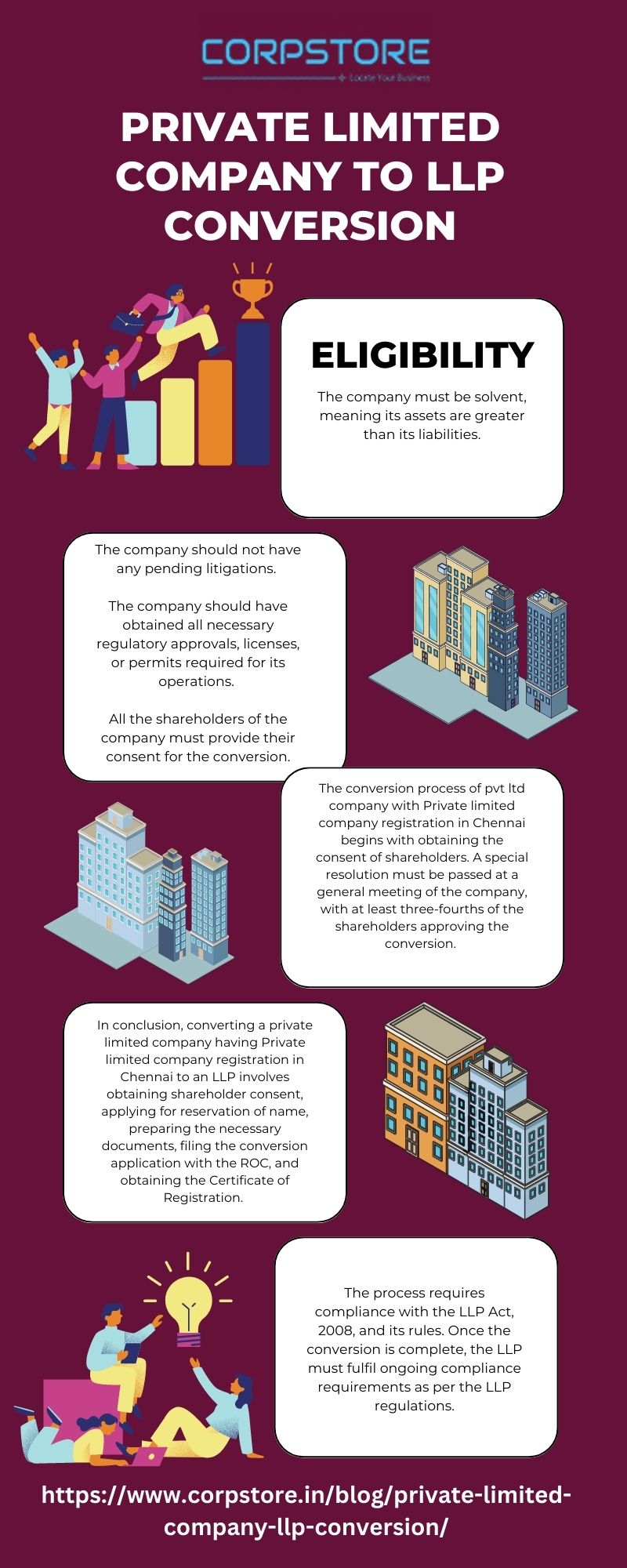Converting a private limited company to a Limited Liability Partnership (LLP) in India involves a legal process that allows the company to transition to a different business structure. The conversion from a private limited company to an LLP can offer certain advantages such as simplified compliance requirements, flexibility in management, and limited liability protection to the partners. In this article, we will explain the process of converting a private limited company to an LLP in India.
Eligibility Criteria:
Before initiating the conversion process, it is important to ensure that the private limited company with Private limited company registration in Chennai meets the eligibility criteria for conversion to an LLP. The criteria include:
a. The company must be solvent, meaning its assets are greater than its liabilities.
b. The company should not have any pending litigations.
c. The company should have obtained all necessary regulatory approvals, licenses, or permits required for its operations.
d. All the shareholders of the company must provide their consent for the conversion.
Obtain Consent:
The conversion process of pvt ltd company with Private limited company registration in Chennai begins with obtaining the consent of shareholders. A special resolution must be passed at a general meeting of the company, with at least three-fourths of the shareholders approving the conversion.
The special resolution must also authorize a designated partner to make the necessary applications and sign the documents on behalf of the company.
Obtain Digital Signature Certificates (DSC) and Designated Partner Identification Numbers (DPIN):
The designated partner(s) of the pvt ltd company with Private limited company registration in Chennai must obtain their DSC and DPIN. DSC is necessary for signing electronic documents, and DPIN is a unique identification number required for designated partners in an LLP. The DSC and DPIN can be obtained by submitting an online application to the Ministry of Corporate Affairs (MCA).
Application for Reservation of Name:
Once the consent of shareholders is obtained, an application for reservation of name must be made to the Registrar of Companies (ROC). The company can propose a new name for the LLP or retain the existing name of the pvt ltd company with Private limited company registration in Chennai.
The proposed name should comply with the naming guidelines prescribed by the MCA. Upon approval, the ROC will issue a Name Availability Certificate.
Preparation of Documents:
The next step involves preparing the necessary documents for the conversion. The following documents are typically required:
- Application for Conversion:
A form prescribed by the MCA, along with the necessary attachments and declarations, must be filed. The form includes details such as the corporate identity number of existing pvt ltd company with Private limited company registration in Chennai, date of incorporation, registered office address, and the proposed name of the LLP.
- Statement of Accounts and Solvency:
A statement of accounts and solvency must be prepared. This document should include the audited financial statements of the company, which provide an overview of its assets, liabilities, and solvency position. The statement should be prepared based on the latest audited financial statements of the company.
- Consent of Creditors:
The consent of all existing creditors must be obtained. A written consent letter from each creditor, indicating their no-objection to the conversion, should be submitted along with the application.
- Consent of Partners:
All the partners of the pvt ltd company with Private limited company registration in Chennai must provide their consent to become partners in the LLP. This consent should be in writing and submitted as part of the application.
- Draft LLP Agreement:
A draft LLP Agreement, which outlines the rights, duties, and responsibilities of the partners, must be prepared. The LLP Agreement should be in accordance with the LLP Act, 2008, and its rules. The agreement should specify the capital contribution, profit-sharing ratio, and other terms agreed upon by the partners.
- Other Supporting Documents:
Additional documents such as the Name Availability Certificate, board resolutions, identity proofs, address proofs, and PAN cards of the designated partners should be submitted along with the application.
This is done for conversion of pvt ltd company with Private limited company registration in Chennai into LLP.
Filing of Conversion Application:

Once all the necessary documents are prepared, they must be filed with the ROC within 15 days of obtaining the Name Availability Certificate. The application for conversion, along with the supporting documents, should be filed online through the MCA portal.
Publication of Notice:
After filing the conversion application, a public notice must be published in a prescribed format in at least one English newspaper and one vernacular newspaper circulated in the district where the registered office of the company is located.
The notice should mention the intention of the company to convert into an LLP and invite objections, if any, from the public within a specified period (usually 21 days).
Issuance of Certificate of Registration:
Upon receiving the application, the ROC will examine the documents and verify their compliance with the LLP Act, 2008, and its rules.
If the ROC is satisfied with the application, the Registrar will issue a Certificate of Registration, confirming the conversion of the private limited company with Private limited company registration in Chennai into an LLP.
The Certificate of Registration includes details such as the LLP identification number and the date of conversion.
Post-conversion Compliance:
Once the conversion is complete, the LLP must comply with the ongoing requirements of an LLP, including:
a. Obtaining a new PAN and TAN for the LLP.
b. Updating the statutory records and registers, including the LLP Agreement.
c. Filing annual statements, financial statements, and other required documents with the ROC.
d. Complying with the income tax, GST, and other applicable regulatory requirements.
e. Making necessary changes to the company’s branding, stationery, and official documents to reflect the new entity as an LLP.
It is important to note that the conversion process may take several weeks, depending on the workload of the ROC and the compliance requirements.
Seeking professional assistance from chartered accountants, company secretaries, or legal experts can help streamline the conversion process and ensure compliance with all legal formalities.
Conclusion
In conclusion, converting a private limited company having Private limited company registration in Chennai to an LLP involves obtaining shareholder consent, applying for reservation of name, preparing the necessary documents, filing the conversion application with the ROC, and obtaining the Certificate of Registration.
The process requires compliance with the LLP Act, 2008, and its rules. Once the conversion is complete, the LLP must fulfil ongoing compliance requirements as per the LLP regulations.



